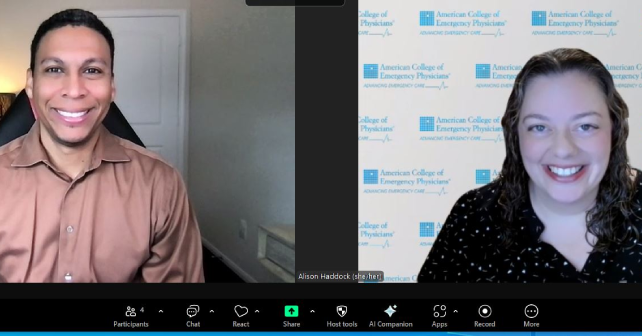
I think we need to pressure all kinds of employers to offer more autonomy. CMGs are part of the problem, but so are giant, giant, giant academic groups where you just have such huge group size that the power is not localized at all. It’s all centralized. The folks on the ground, who are living the life and seeing the patients, aren’t able to talk to the folks who are making the decisions.
Explore This Issue
ACEP Now: Vol 43 – No 12 – December 2024It’s important for ACEP to help be that voice for those physicians, and to encourage employers of all kinds to offer transparency about how they do their business, and how they follow ACEP policies or don’t. That’s one of the drivers of ACEP Open Book—to have a place where you can go when you’re looking for a job to say, “Does this site [or] this employer adhere to ACEP policies that are intended to protect the emergency physician?”
Dr. Dark: Like you said, academic groups sometimes can be like these large mega groups. Even still, physician-owned groups are not immune to these kinds of difficulties. One of the major things breaking in the news cycle now is that a [physician-owned] group, NES Health, has had some difficulties with financial pressure paying their employees. What do you think is the outlook for the business of emergency medicine when we’re seeing these disruptions happening all the way from larger groups to even the physician-owned groups?
Dr. Haddock: What happened with American Physician Partners (APP) was unacceptable, where people were left without malpractice tail coverage due to group transitions. I just hope that we don’t see that same thing happen with NES. It does show that this is happening across models of providers of emergency medicine services, because those have two different business models, with APP having more private equity involvement and NES being more individual physician-led.
Part of what’s driving all of this is consolidation in the health care industry overall, which means consolidation of hospitals and consolidation of insurance companies. A lot of what’s driving consolidation of [physician] employers is the fact that to be able to fairly position yourself and negotiate with these mega conglomerate insurance companies, you need to have a group of a certain size. I believe we need to be looking at consolidation across health care because it’s having negative consequences on multiple levels—not just the insurance company level, not just the physician group level, but all these levels. They’re decreasing the amount of choice that patients have, and they are leading to imbalances in the marketplace.




No Responses to “A Conversation with ACEP President Dr. Alison Haddock”